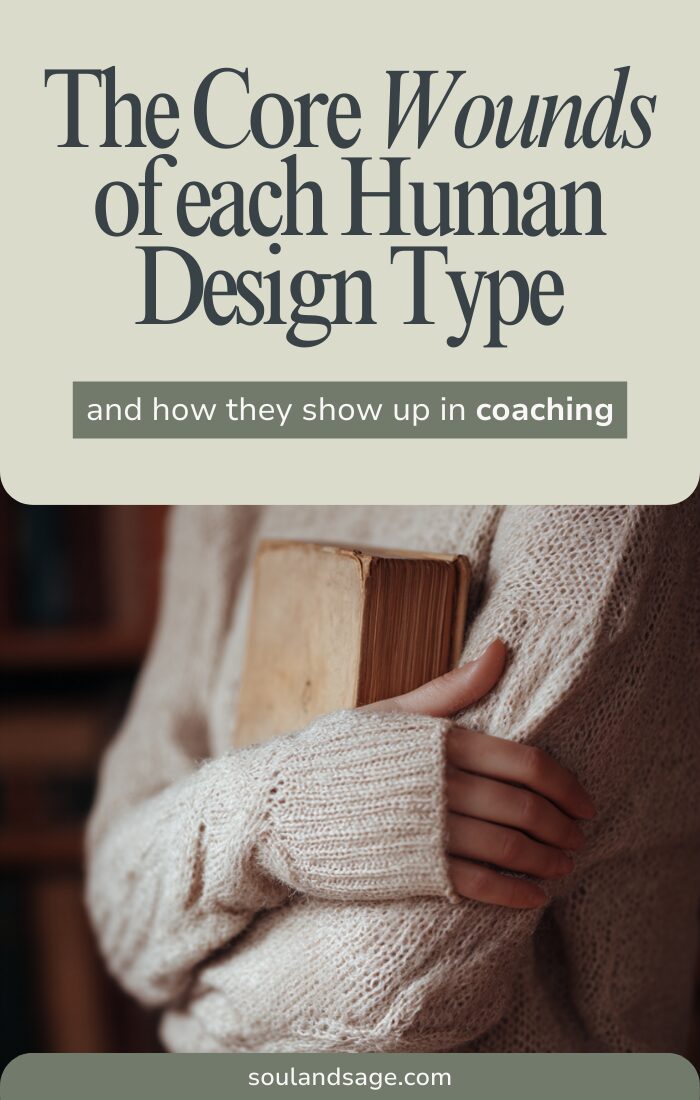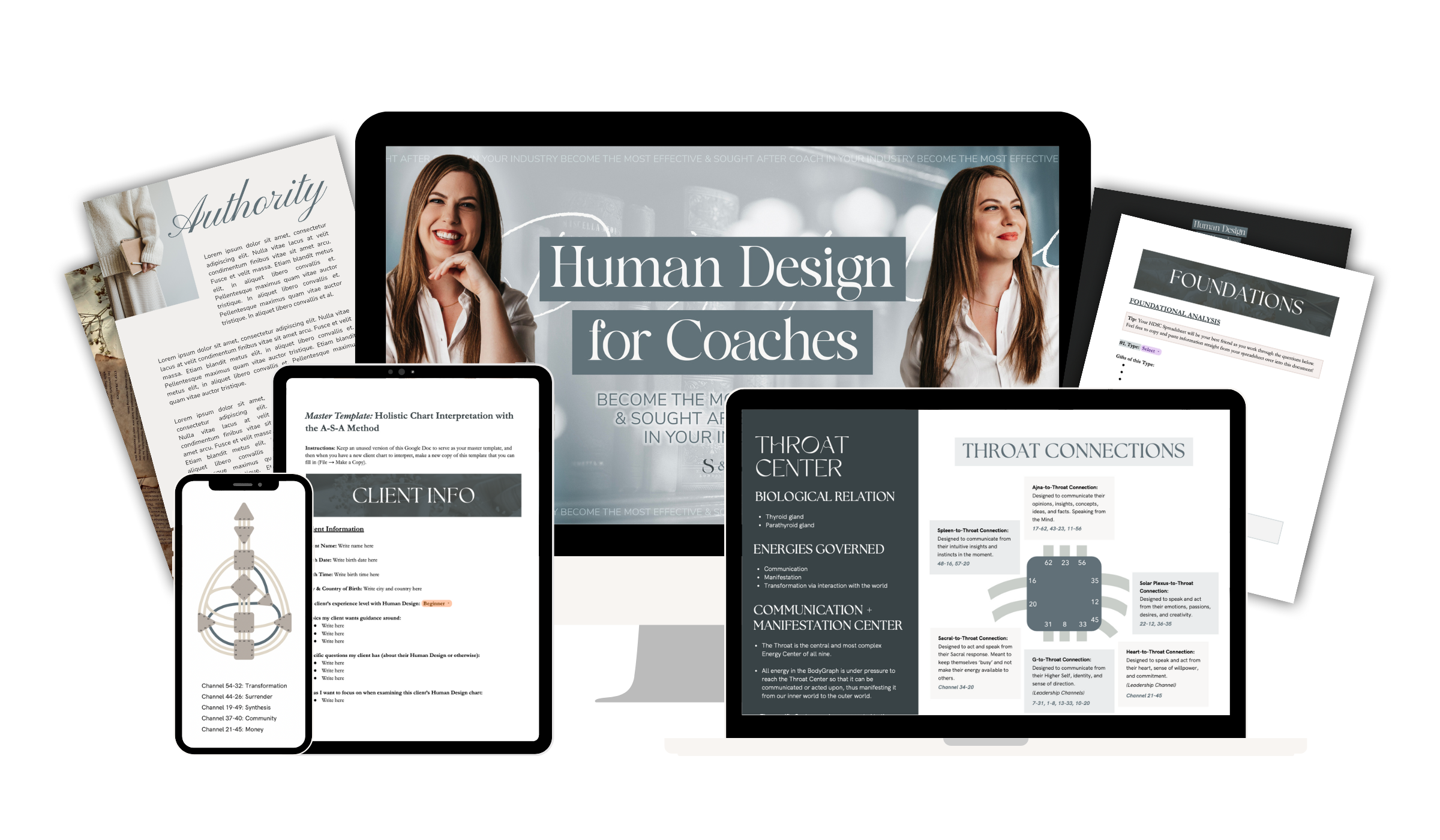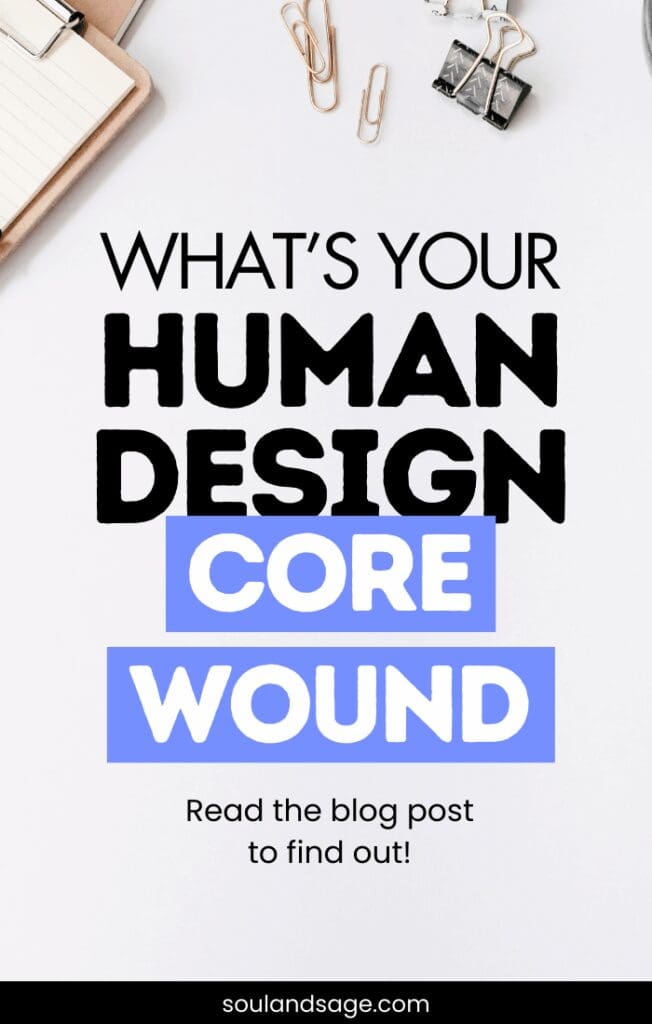If you’re a coach who uses Human Design with your clients, you probably already know that each Type comes with its own gifts and challenges. But what’s talked about less often (and is so important to understand!) is that each Human Design Type often struggles with specific “core wounds”.
These core wounds might show up as recurring patterns in your client’s behavior, relationships, beliefs, or self-talk. They often stem from early childhood conditioning and experiences where they were misunderstood, judged, or expected to show up in a way that went against their true nature.
In this post, we’ll explore three of the most common core wounds for each Human Design Type, and how you can use this information to support your clients in their healing journey.

What Are “Core Wounds”?
A core wound isn’t an innate flaw. It stems from early conditioning, or even a past life or your ancestral line. It can also develop as the result of living out of alignment – e.g., of trying to operate like a different Type, suppressing your natural energy, or being shamed by authority figures for how you’re naturally designed.
Core wounds can lead to:
- Chronic emotional patterns (e.g., bitterness, frustration, anger, or disappointment)
- Confusion around who you are and how you’re meant to move through life
- Overcompensating behaviors (people-pleasing, burnout, shutting down)
- Deep inner resistance to living authentically as your true, full self
Core Wounds of Each Human Design Type
This is by no means an all-inclusive list, and every single person won’t fall neatly into these descriptions. That’s okay. Use this information as a jumping off point, keeping your ears open for these buzz words throughout your coaching sessions.
Common Manifestor Core Wounds
- “I’m too much / I’m not allowed to be powerful.”
Many Manifestors grow up being told to tone it down, follow the rules, or ask for permission. Over time, they end up suppressing their boldness and bigness. - “I have to do everything alone.”
These clients are naturally self-contained and self-sufficient. However, this doesn’t mean they’re meant to be lone wolves. They’re here to be the Alpha Wolf, the one leading the pack. - “I’m dangerous or unpredictable.”
Other people might fear, judge, or resist their energy, which can make Manifestors doubt themselves — and some end up avoid initiating (their main purpose!) altogether.
Common Generator Core Wounds
- “My worth is tied to how much I do or give.”
Generators are often conditioned to be productive above all else. This can lead to burnout or chronic frustration when they pour themselves into things that aren’t actually right for them. - “I have to figure it all out ahead of time.”
Instead of waiting to respond, they might feel pressured to push for things to happen or to plan out their whole life ahead of time. This can cause them to miss aligned opportunities because they’re trying to *make* things happen instead of *letting* things happen as they’re meant to. - “I don’t know what I really want.”
Years of people-pleasing and giving in to the “shoulds” can disconnect them from their Sacral’s response. It takes time and intentional practice to reconnect to the guidance of their Sacral.
Common Manifesting Generator Core Wounds
- “I’m flaky or too scattered.”
Mani-Gens often carry shame for changing directions often or not finishing things. But in reality, this is part of their unique magic and genius. They’re here to be multi-passionate and non-linear — not to walk the same path as everyone else. - “I make too many mistakes. I need to slow down.”
While some mistakes can be avoided, MGs like to move quickly, and they’re designed to. They’re efficient, and they can see which steps in a process can be skipped over. Does this mean they always get it right on the first try? No. But that’s okay. - “I’m too much for people.”
Similar to Manifestors, some Manifesting Generators end up feeling completely misunderstood by others. They might shrink themselves down or try to follow the “right” path in life, rather than the path that’s right for them.
Common Projector Core Wounds
- “I’m invisible. No one really sees me or ‘gets’ me.”
Projectors thrive on being recognized and invited, but many spend their lives feeling overlooked or like they don’t truly fit in or belong. They’re different from 80% of the world, and it can be hard for Projectors to feel unseen when they see others so deeply and clearly. - “I have to prove my value to be successful.”
Projectors often overwork or over-give in an attempt to be seen as valuable (#guiltyascharged), despite not having the energetic capacity to keep up the hustle indefinitely. This is a big cause of the (oh so common) Projector burnout. - “I’m lazy or broken.”
In a Sacral-driven world, a Projector’s need for rest and a slower pace of life can be misinterpreted as a weakness, by both themselves and others. But really, it’s one of their biggest gifts. They’re not here to work 40-50 hours a week. They’re here to show up when it counts, share their wisdom and guidance where it’s needed, and then retreat to recharge.
Common Reflector Core Wounds
- “I don’t know who I am.”
With no defined Energy Centers, Reflectors often struggle to feel clear and grounded in who they actually are (especially in unsupportive environments). The undefined G Center can be one of the biggest sources of conditioning in anyone’s chart, and Reflectors are no exception. - “I’m too sensitive for this world.”
The Reflector’s openness means they absorb so much not-self energy from the people and environments around them. They might feel overly sensitive, and need to learn to set clear energetic boundaries around themselves. - “There’s something wrong with me.”
Because they don’t operate like 99% of the world, Reflectors might feel like they’re “defective”. In reality, they’re perfect exactly as they are, but many Reflectors don’t fully accept that until they learn about Human Design and what it means to be a Reflector.
How to Use This Info in Your Coaching Practice
Understanding your client’s biggest core wounds helps you coach them on a much deeper level.
You can:
- Normalize their experience (“Of course you feel this way, it makes sense with your design and what you’ve gone through in life.”)
- Invite them to explore what feels truly aligned vs. what’s expected of them.
- Speak to the core wound and gently work through the process of releasing negative beliefs and coming back into true alignment.
- Guide them in deconditioning with compassion rather than falling into the “shame and blame” game.
Go deeper inside the Human Design for Coaches program 🌿
If you’re ready to learn the Human Design system and use it to shape the way you guide your clients, HDfC is the space for you. Get instant access to the full certification program on a payment plan that works for you. Click here for all the details.

Loved this post? Save it on Pinterest! ↓


Share this post: